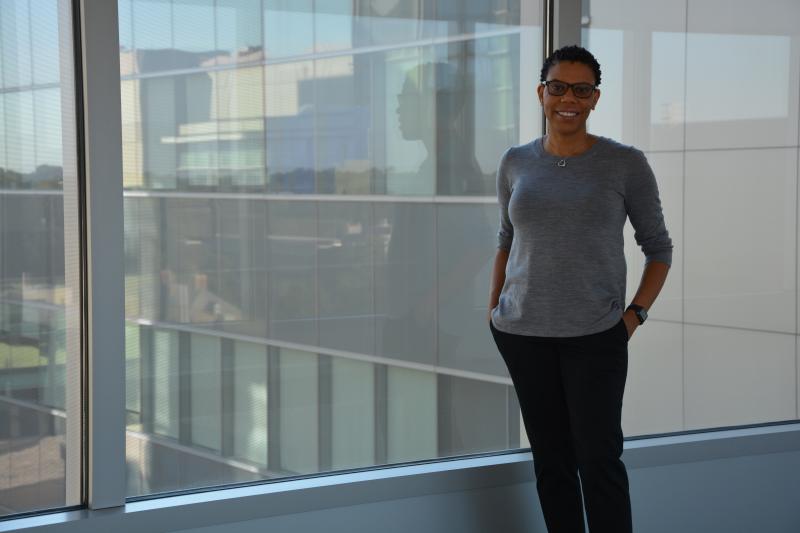
Rasheeda Hall, MD, MBA, MHS, assistant professor of medicine (Nephrology), is drawn to complexity. When she was a resident at Duke, she says, “I felt a heart tug to nephrology because these patients were sicker and more complex patients.”
Today, after completing a fellowship in Nephrology at Duke, she is a geriatric nephrologist, with the goal of making life simpler and better for these patients. She is using tools from geriatrics and pharmacology in her quest to improve quality of life and address patient goals of care. Dr. Hall hopes some of her work eventually will help inform geriatric nephrology on a larger scale.
When Hall began looking into ways of improving outcomes in her elderly kidney patients, many of whom struggle with frailty and functional decline, she discovered there were not a lot of datasets to explore, so she designed a project herself.
“If we can understand how to measure quality of life, we can pursue interventions and know we’re on target to address things that matter most to the patients,” Hall said.
In a project funded by National Institutes of Health and the American Society of Nephrology, Hall interviewed older patients with kidney disease, using the Kidney Disease Quality of Life assessment tool as well as some questions she created to elicit the patients’ own goals for their care. The results showed that several goals predominated: staying independent as long as possible, having enough energy to participate in meaningful activities, and maintaining cognition.
In thinking about how to help patients meet these goals, Hall turned to geriatrics. She tested assessments long used in geriatrics, such as gait speed and hand grip, to demonstrate their feasibility in nephrology patients in a project funded by the Duke Clinical and Translational Science Institute (CTSI) KL2 program. She is now interviewing patients to inform the development of interventions to improve physical functionality.
Last year, at an American Geriatrics Society (AGS) conference, Hall became interested in another approach to improving quality of life: addressing issues arising from polypharmacy (taking multiple medicines). Older patients with kidney disease typically take many medications, some of which may increase the risk for falls or confusion. Hall thinks it is worth asking whether the side effects outweigh the benefits in some cases.
“I was really excited,” she said. “My hypothesis is if we remove or de-prescribe certain medications, we may find it helps patients maintain their independence or energy or cognition.”
Polypharmacy is by nature complex, but it is even more complicated in Hall’s patients. Medicines behave differently in aging bodies, and people with kidney disease often don’t clear medicines from the body efficiently. In dialysis patients, certain toxins can build up and further complicate how or whether medicines are cleared.
“We might be inappropriately dosing people with kidney disease,” Hall said. “It makes it even more important to think about how we prescribe medications for people with renal failure.”
If we can understand how to measure quality of life, we can pursue interventions and know we’re on target to address things that matter most to the patients.
Rasheeda Hall, MD, MBA, MHS
Hall will be exploring the potential benefits of de-prescribing with funding from two awards. The first is the Paul B. Beeson Emerging Leaders Career Development Award in Aging, which is jointly sponsored by the National Institute on Aging, the John A. Hartford Foundation, and the National Institute on Neurological Disorders and Stroke. The second is the American Society of Nephrology-Harold Amos Medical Faculty Development Program Award, sponsored by the ASN and the Robert Wood Johnson Foundation.
With the Beeson award, she will investigate de-prescribing in older dialysis patients as a mechanism for improving quality of life. She plans to do the same with the Amos grant, but with kidney patients not on dialysis.
“Which population would benefit the most from a de-prescribing intervention?” she asks. “Are we too late in the game for some of our patients on dialysis? On the flip side, some patients with chronic kidney disease might not have so many medical problems and might not be interested in de-prescribing in general.”
In each project, Hall plans to do a pilot study focusing on several categories of medicines with a high potential for detrimental side effects in older people.
“Both the Beeson and the Amos awards will get me to a new skill set: clinical trials,” Hall said. She worked with the Duke Office of Clinical Research (DOCR) when recruiting patients for her KL2 project, and she anticipates using their services again. “DOCR has some great resources,” she said.
As a young physician-scientist, Hall has made good use of mentors and other resources. She especially credits the support of Cathleen Colón-Emeric, MD, professor of medicine (Geriatrics). “She has this cool title, associate dean for research mentoring, and she deserves it,” Hall said. “She helped steer me in the right direction as a fellow.”
As Hall has grown as a researcher, Colón-Emeric’s style with her has changed. “Now when I ask a question, she tends to ask me a question back,” Hall said. “She’s gearing me up.”
Hall also has taken advantage of many opportunities designed to support researchers at the beginning of their careers, including the School of Medicine’s LEADER program and K Club, the CTSI’s KL2 Application Prep Program (KAPP), the Department of Medicine’s Faculty Development Academy, and the Department’s Research Development Council (which did a concept review of her Beeson application).
Hall earned an MBA in tandem with her medical degree at Vanderbilt University, and at one point considered pursuing hospital administration. But she says, “I realized I would rather build the evidence that informs the business.”
Her current work is putting her on that path.
“The end goal for my research is that it changes policy and practice, such that people who are practicing in nephrology would be trained to think about geriatric problems in their patients and be fully equipped to do something about it,” Hall said.
This story was written by freelance writer Mary-Russell Roberson.